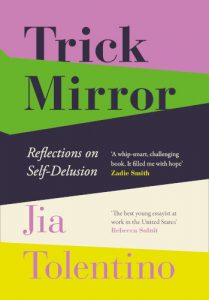In Trick Mirror: Reflections on Self-Delusion, Jia Tolentino presents her cosmopolitan obsessions with piercing insight and authority, writes Khanya Mtshali.

Trick Mirror: Reflections on Self-Delusion
Jia Tolentino
Fourth Estate, 2019
For a writer who produces bold and self-assured work as consistently as Jia Tolentino, it can be difficult to believe her when she states, in the introduction to her debut collection of essays, Trick Mirror: Reflections on Self-Delusion, that she tends to write away her confusion until she appears ‘plausibly trustworthy, intuitive, and clear’. It’s not that this is an unusual way for writers to approach their craft. The very act of writing can help one form ideas and dispel uneasiness over difficult subjects, paving the way for observations to be unearthed. However, in Tolentino’s case, it’s difficult to imagine she arrives at her keyboard being anything other than trustworthy to herself. ‘Writing is either a way to shed my self-delusions or a way to develop them,’ she writes, in a sentence so stylish and slick that you almost believe her.
In Trick Mirror, we get the delight of Tolentino over nine sprawling essays, each guided by the conviction with which she presents all her cosmopolitan obsessions. In what feels like breakneck speed, Tolentino takes us through her stint as a chaste but self-aware reality television personality, the seven blockbuster scams of the last decade or so, a reflection on the gender and sexual politics of her alma mater, the University of Virginia, as well as a Ted Talk-ish meditation advertising her decision not to get married despite the allure behind the ritual of marriage—a surprisingly flat piece by her standards. As you parse through these essays, it becomes clear that trusting whatever Tolentino tells us is beside the point. In fact, what she’d like you to know is that everything, from your identity to your political beliefs, your social media profile to your private indulgences in beloved skincare products and fussy salads, is part of a buffet of self-delusions necessary for you to survive in our late-capitalist hellscape.
Our inability to escape the trappings of self-delusion are discussed, quite bleakly, in her first essay, ‘The I in the Internet’, which provides the evolution of how our engagement with the world wide web turned toxic and tragic. It’s a hard-working piece of writing that seeks to make sense of the way we present ourselves and engage with one another online. Tolentino begins the essay with an account of her first documented use of the internet, airlifting an adorable remark from her childhood journal where she states, ‘I was in love with the internet the first time I used it at my dad’s office and thought it was the ULTIMATE COOL’. She then goes on to bring up sites like Angelfire and Expage, all part of Web 1.0, recalling how infinitely hopeful and exciting the internet seemed during this time:
In 1999, it felt different to spend all day on the internet. This was true for everyone, not just for ten-year-olds: this was the You’ve Got Mail era, when it seemed that the very worst thing that could happen online was that you might fall in love with your business rival. Throughout the eighties and nineties, people had been gathering on the internet in open forums, drawn, like butterflies, to the puddles and blossoms of other people’s curiosity and expertise.
She then moves on to Web 2.0, a period defined by platforms like MySpace and Blogger. ‘As more people began to register their existence digitally,’ Tolentino writes, ‘a pastime turned into an imperative: you had to register yourself digitally to exist.’ In turn, these changes sowed the seeds for the internet to become the eventual ‘home of self-expression’. Naturally, some of these summaries veer into generalisation, but Tolentino’s first-hand user experience lend them integrity and reliability. Rather abruptly, however, we’re yanked into the year 2012 which, Tolentino decisively states, is the time when people started ‘losing excitement about the internet’:
Facebook had become tedious, trivial, exhausting. Instagram seemed better, but would soon reveal its underlying function as a three-ring circus of happiness and popularity and success. Twitter, for all its discursive promise, was where everyone tweeted complaints at airlines and bitched about articles that had been commissioned to make people bitch.
Crediting a single year with the deterioration of all those platforms strikes me as a bit too pat. Even if this is truly how Tolentino believed The Fall of the Internet began, the description of the initial decline seems less like the beginning of the end of the web, and more like an especially grating day on any given social media platform. Additionally, experiences of the internet are determined, like most things in life, by race, gender, class, sexuality and other markers of identity. I make this basic observation not as some trite demand for ‘representation’, or as a throwback to the days when people were asked to ‘check their privilege’. Instead I raise it up as a reminder of how differently we all experience being online. Take Twitter before 2012, and roughly up until 2015, for example. For many black women tweeting in English, the platform was a space in which they were likely to witness or experience cruel comments about anything from the texture of their hair, the so-called ugliness of their skin tone, their alleged inferiority to white women and non-black women of colour and their supposed attitude problem. Even famous black women like Serena Williams and Beyoncé, now practically universally beloved, weren’t spared during this period. Perhaps this is one of the drawbacks of being recruited as one of the primary spokespersons for everything considered emblematic of our ‘current political moment’: it is nearly impossible to provide a cohesive overview of a place as vast, weird and messy as the internet.
However, Tolentino does make astute observations of the evolution of American media in the age of social media, zeroing in on the internet’s preoccupation with delivering opinions. She declares that being polemical has now been ‘framed as a sort of action’—something which she admits to benefitting from. I question the logic of writing about ‘opinion’ and ‘action’ as though they are mutually exclusive when, especially now, the former often jumpstarts the latter. I wonder whether those unfamiliar with the dynamics of ‘Media Twitter’—in particular its American branch—would find Tolentino’s descriptions of life online as strangely intense. While people who write on the internet or follow internet writers might be acquainted with the pressure to be constantly ‘on’, I question whether this internal tussle would make sense to someone like my brother, for example, who has several hundred followers, tweets mostly about sport and occasionally advertises his weekly podcast. Even if he did want to tweet something critical about a certain issue, politician or writer, he would not have to debate, like I’ve done, whether this kind of discussion would be better suited to a group chat.
Some of the early appraisals of Trick Mirror have mentioned that Tolentino is often called the millennial answer to Joan Didion. Interestingly, I only found one direct comparison between the New Yorker writer and the revered New Journalist, published in a blurb written by the writer Maris Kreizman for Vulture. While both writers possess a keen eye for detail and capture the mood of the times coolly, the comparison comes across as a bit inaccurate and, dare I say, lazy. Where Didion and Tolentino differ, at least in my view, is on the topic of feminism, which appears to have informed Tolentino’s own writing, while being a target of pointed irritation and subtle mockery in Didion’s.
Over the years, several Western feminists have attempted to justify their love of Didion, once considered a sacrilegious act if you were down with Gloria Steinem’s version of women’s liberation. Didion’s 1972 essay ‘The Women’s Movement’ has since been reimagined as a benevolent critique of the second wave, instead of what it really is: a sharp but dismissive and snooty critique of the women who pamphleteered and picketed for gender equality. Tolentino, on the other hand, has always seemed, not just because of her time at The Hairpin and Jezebel, as the kind of woman writer who lodges her apprehensions about the movement in good faith, treating her women subjects and their respective views with nuance and complexity. Speaking to Vanity Fair this August, Tolentino cited the cultural critic Ellen Willis as someone she admired for ‘criticising feminism from within it’—which she herself accomplishes successfully in several of the essays in Trick Mirror.
In ‘Always Be Optimising’, arguably the finest piece of writing in this collection, Tolentino looks at, among other things, the gradation of female presentation in a world where ‘packaging and broadcasting your image is a readily monetisable skill’. ‘The ideal woman’, she begins, ‘has always been generic’, a fact which the reader might agree with until they realise Tolentino isn’t just speaking in the past tense. In most reviews of Trick Mirror, descriptions of this essay tend to lead with Tolentino’s investment in barre classes, her relationship with Sweetgreen salads, her thoughts on athleisure and her doubly complicated feelings about shapewear. These are all admittedly brilliant, but it’s her riffs on the ‘ideal woman’ that elevate this already exquisite essay into something timely and timeless. Tolentino prompts moments of uncomfortable introspection in her readers. She states in one passage that ‘when you are a woman, the things you like get used against you’, illustrating how things that offer women brief moments of joy or affirmation—like beauty work, for example—can also function as an apparatus of capitalism and patriarchy.
Whether you’re the kind of girl who referred to yourself as a feminist in a sociology class, purchased a ‘The Future is Female’ shirt, or drape your critiques of mainstream feminism in thick layers of irony, Tolentino admits that these sort of realisations can be ‘brutally disempowering’. She questions, without being patronising, why we continue to place such a high value on beauty and a woman’s need to be beautiful. Instead of doing away with this societal requirement, we’ve democratised it, making it ‘politically important to designate everyone as beautiful’ because it’s much harder, Tolentino argues, to ‘imagine what it might look like if our culture could do the opposite’. For her, the central problem is mainstream feminism’s refusal ‘to admit that women’s choices—not just our problems—are, in the end, political’, an arresting line that exposes how our perception of liberation remains modest and undemanding.
‘The Cult of the Difficult Woman’ analyses how the culture’s recent embrace of ‘female difficulty’ has created a unique set of problems for how we’re allowed to talk about women. As Tolentino writes, ‘[c]elebrities have been the primary teaching tools through which online feminism has identified and resisted the warping force of patriarchal judgment’. This has allowed for the lives of famous women, who were previously understood along sexist lines, to be reinterpreted as ‘feminist text’. Tolentino acknowledges that these efforts to remedy years of misogynistic coverage has not only allowed for the legacies of misunderstood women to be corrected, but also seen the ‘stories surrounding ordinary women [be] … reclaimed too’. But, perceptive as ever, she sees the real danger in all of this. ‘When the case for a woman’s worth is built partly on the unfairness of what’s levelled at her, things get slippery,’ she writes, emphasising that it is impossible for any woman not to encounter criticism during the internet age. For Tolentino, such ‘criticism [will] always [exist] in the context of sexism just like everything else in a woman’s life’, which has unfortunately led to the idea ‘that harsh criticism of a woman is itself always sexist, and furthermore … receiving sexist criticism is in itself an indication of a woman’s worth’.
She refines this point further by using American Republican politicians like Kellyanne Conway, Sarah Huckabee Sanders, Hope Hicks and First Lady Melania Trump as examples of women who’ve swatted away critiques of their actions through the guileful use of the difficult woman doctrine. Since these women have qualities that are considered ‘unruly’ and ‘difficult’, they’re absolved of any criticism, however inane or valid, not just by women who share the same politics as them, but by liberal feminists who perceive any criticism of a woman as sexist. When Tolentino writes, ‘I have wondered if we’re entering a period in which the line between valuing a woman in the face of mistreatment and valuing her because of that mistreatment is blurring,’ one understands that things are already past the point of return, making the future of feminist discourse seem more desperate than before.
Tolentino also notes the development of a ‘countervailing feminist distaste’ for the absence of difficulty and unruliness in women, observing the ire directed at ‘lifestyle bloggers, beauty and wellness types, generic influencers with long Instagram captions and predictable tastes’. As someone who used to relish this sort of activity, it becomes obvious that this does nothing but create even more hate, dislike and mistrust of a femininity which was hitherto considered the norm. She delivers what reads as both a rallying cry and exhausted plea at the alarming punitiveness of these unnecessary standards:
The freedom I want is located in a world where we wouldn’t need to love women, or even monitor our feelings about women as meaningful—in which we wouldn’t need to parse the contours of female worth and liberation by paying meticulous personal attention to any of this at all.
In the essay ‘Ecstasy’, Tolentino threads her childhood spent in an evangelical church (comically named ‘The Repentagon’) to her introduction to chopped and screwed, a style of hip-hop from the city of Houston, Texas, where she grew up, to her experience taking the drug ecstasy (also known as molly). As someone who attended a Pentecostal primary school where it wasn’t uncommon for teachers to blame the devil for our lack of attentiveness towards the end of the school year, I felt a panging sense of recognition in these scenes. Former Christians have a tendency to discuss their years in the church with condescension and embarrassment, often dismissing the rituals and sense of community which lead even the most sceptical of us to find refuge in institutionalised religion. Tolentino avoids this trap artfully, exploring the limits of the zany, white, Southern brand of Christianity she grew up with, while also acknowledging how it ‘formed [her] deepest instincts’, shaped her ‘leftist worldview’ and gave her an ‘obsession with everyday morality’. Tolentino’s writing is motivated by an earnest pursuit of human decency at a time when more and more Americans seem to be coming to terms with the shattering of their nation’s image as a bastion of freedom and democracy.
The Trump era has seen an increasing demand for writers, journalists and critics who can explain and reflect these ‘terrifying times’. While the desire to make sense of the confusion is a normal response heightened chaos and uncertainty, it has also created a type of cultural writing which considers the private responses and feelings of liberals to these hellish events as the actual hell itself. With Trick Mirror, Jia Tolentino mostly manages to resist this kind of fatalistic and self-indulgent solipsism, despite admitting to being despondent. She acknowledges the prevailing sentiments, but manages not to be completely crushed by them. She identifies the ways in which we con ourselves in order navigate tricky systems of oppression, but doesn’t call us frauds or phonies for doing so. For the reader who prefers the neatness of written thought as opposed to the unpredictability of written thinking, Trick Mirror will test their patience in the most rewarding way. Tolentino shows us that the pursuit of truth is often more gratifying than having all the answers to hand.





